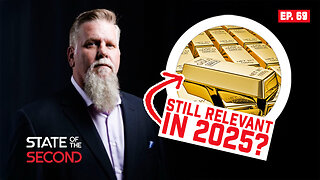Premium Only Content

We are living through a battle against Satan who is the prince of this world Welcome to the Matrix
Beliefs about the devil or Satan vary widely across different cultures, religions, and belief systems. The concept of the devil is often rooted in religious and mythological traditions, and interpretations can differ significantly. Here are some key perspectives from major religions:
Christianity: In Christianity, the devil is often identified with Satan, a fallen angel who rebelled against God and was cast out of heaven. Satan is often depicted as a tempter and an adversary of God and humanity. He is associated with evil, sin, and the forces that oppose God's will. The devil is a central figure in Christian theology and is often portrayed as the ultimate source of spiritual opposition to God and goodness.
Islam: In Islam, the devil is known as Iblis or Shaytan. Iblis was a jinn who refused to bow to Adam and was consequently cast out of God's favor. Similar to Christianity, Shaytan is considered an adversary who tempts humans to sin and leads them away from the path of righteousness. In Islamic belief, humans have free will and are responsible for their actions, but Shaytan is seen as a source of temptation.
Judaism: The concept of the devil is less pronounced in Judaism compared to Christianity and Islam. In Jewish tradition, Satan is sometimes viewed as an angelic figure who challenges individuals in order to test their faith and resolve. The evil inclination (yetzer hara) is often referenced as the internal inclination to do wrong, which humans must resist.
Other Belief Systems: Other religions and belief systems may have their own interpretations of evil or malevolent entities. In some indigenous or pagan traditions, there might be concepts of spirits or entities that represent negative forces. However, these beliefs can vary widely depending on cultural and regional contexts.
It's important to note that the concept of the devil has also been portrayed in literature, art, and popular culture in various ways that might not directly align with religious teachings. Different interpretations and beliefs can lead to varying views on the nature, origin, and role of the devil or evil entities.
Ultimately, beliefs about the devil are deeply rooted in religious and cultural contexts, and perspectives on this topic can be highly diverse and subjective.
The term "Lucifer" originates from a Latin translation of the Hebrew Bible and specifically from a passage in the Book of Isaiah. In the Christian tradition, this passage is often associated with the devil or Satan, although the connection is not straightforward and is subject to interpretation. The passage is Isaiah 14:12-15, and it is as follows (King James Version):
"How art thou fallen from heaven, O Lucifer, son of the morning! How art thou cut down to the ground, which didst weaken the nations! For thou hast said in thine heart, I will ascend into heaven, I will exalt my throne above the stars of God: I will sit also upon the mount of the congregation, in the sides of the north: I will ascend above the heights of the clouds; I will be like the most High. Yet thou shalt be brought down to hell, to the sides of the pit."
The passage is traditionally understood to be a metaphorical lamentation against the king of Babylon, using the imagery of a fallen morning star (Lucifer) to illustrate the king's downfall from a position of power and pride. It's important to note that the original Hebrew text does not use the term "Lucifer" but rather "helel ben-shachar," which translates to "shining one, son of the dawn" or "morning star."
Over time, this passage has been associated with the fall of Satan due to the imagery of a proud celestial being cast down from heaven. However, this connection between Lucifer and Satan is not explicit in the Bible itself and has developed more from later theological interpretations and cultural influences.
In summary, the term "Lucifer" is often associated with Satan based on a passage in the Book of Isaiah, but this connection is not straightforward and is a matter of interpretation and theological tradition.
-
 1:27
1:27
420 VGT LIVE 5.0
1 year agoFormer Illinois Republican Rep. Mike Boast lost his temper
1281 -
 1:37:19
1:37:19
Glenn Greenwald
9 hours agoAs Trump Vows to Restore Free Speech, Harvard Just Assaulted It; Columbia Professor Forced Out Over Israel Criticisms | SYSTEM UPDATE #394
81.5K164 -
 58:45
58:45
The StoneZONE with Roger Stone
6 hours agoTrump Pardons Ross Ulbricht | The StoneZONE w/ Roger Stone
64.8K14 -
 1:57:31
1:57:31
2 MIKES LIVE
15 hours ago2 MIKES LIVE #170 with special guest Rep. Buddy Carter (R-GA)
56.6K3 -
 1:02:58
1:02:58
Flyover Conservatives
1 day agoA Doctors Response to Trump’s First Moves: W.H.O. and FDA - Dr. Troy Spurrill; A REAL-LIFE Approach to Health and Wellness Transformation - Kellie Kuecha Moitt | FOC Show
86.9K6 -
 41:50
41:50
State of the Second Podcast
10 hours agoWhat do Gold and Guns have in common?
40.1K4 -
 1:01:26
1:01:26
PMG
6 hours ago $2.68 earnedLibs In FULL PANIC Since Trump Took Office! Creating a Faith to Fit their Agenda
28.9K9 -
 7:09:22
7:09:22
Dr Disrespect
14 hours ago🔴LIVE - DR DISRESPECT - TRIPLE THREAT CHALLENGE - EXTREME EDITION
258K32 -
 55:00
55:00
LFA TV
14 hours agoThe End of the January 6 Hoax | TRUMPET DAILY 1.22.25 7pm
48.6K12 -
 1:13:37
1:13:37
Battleground with Sean Parnell
12 hours agoPresident Trump Is On FIRE w/ Savage Rich Baris
187K27